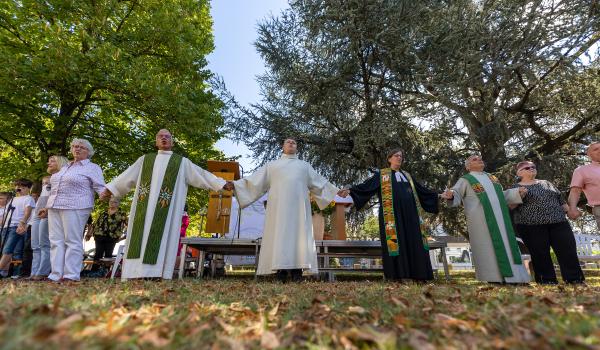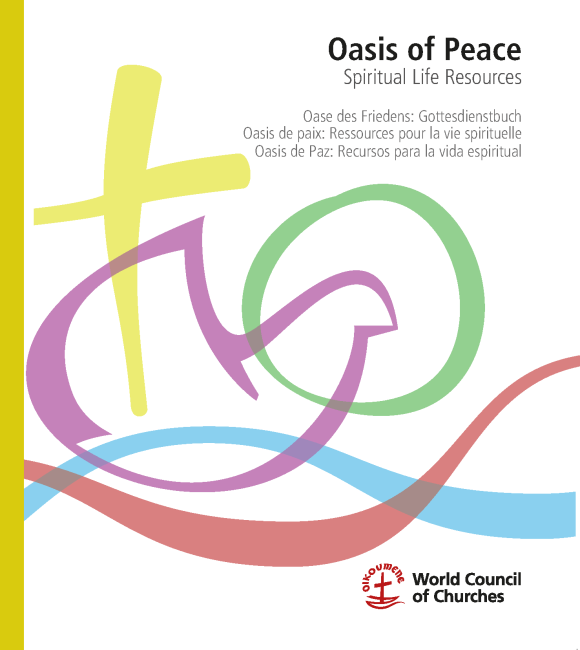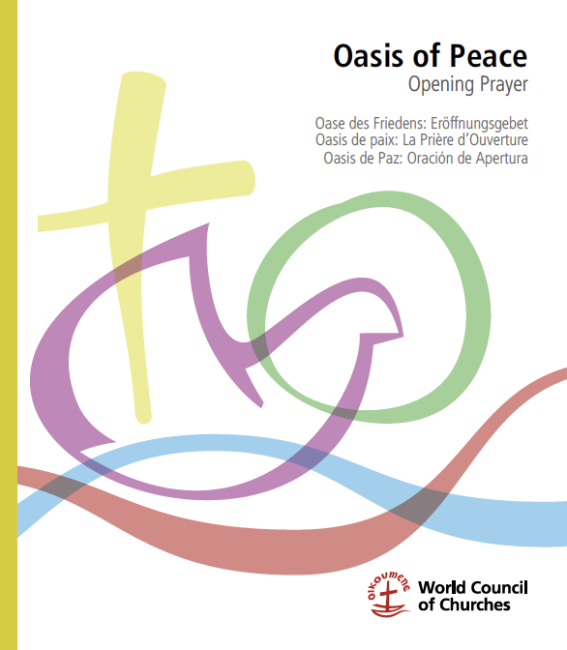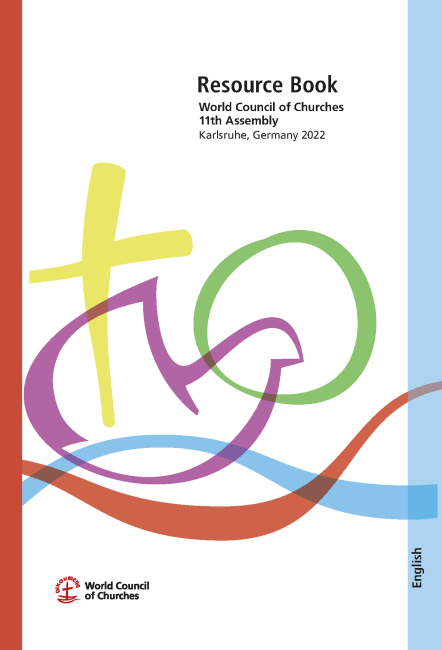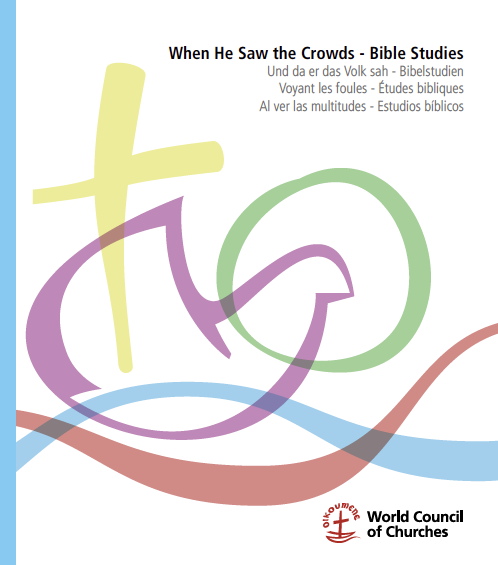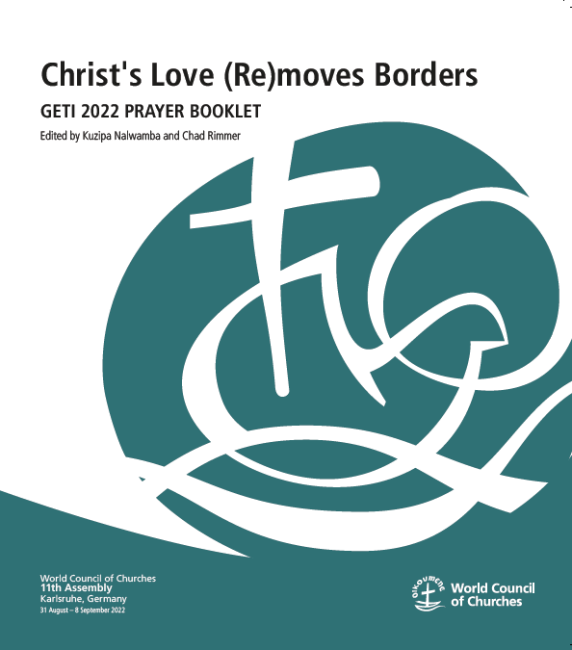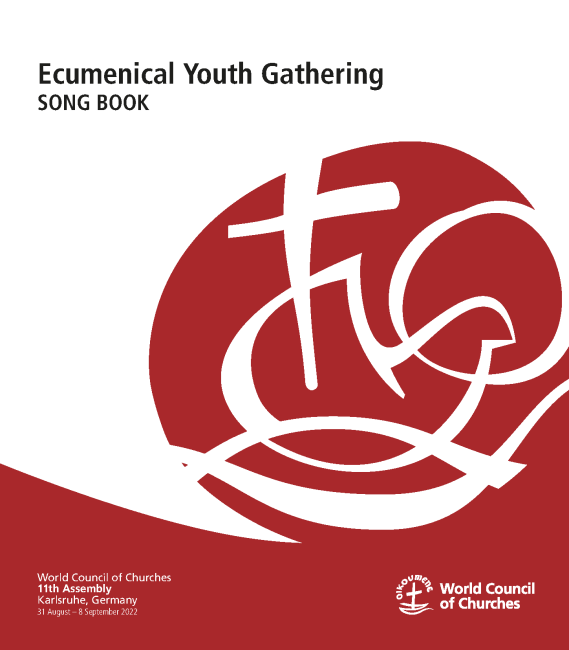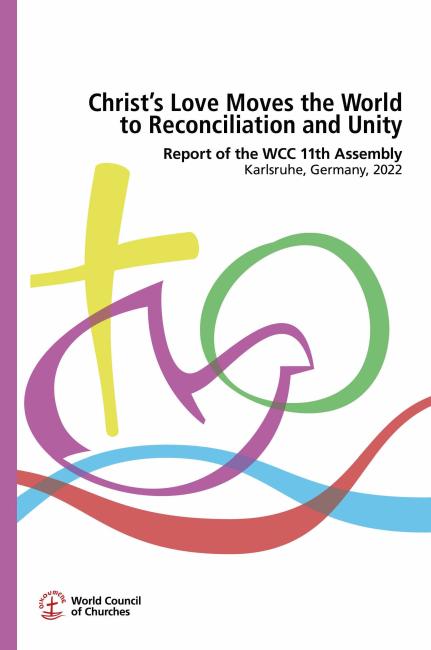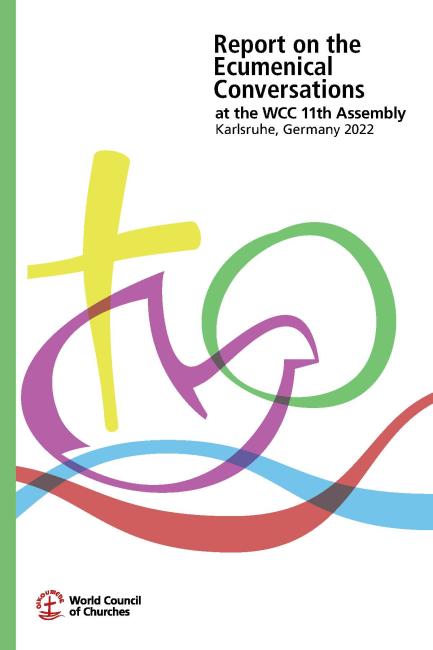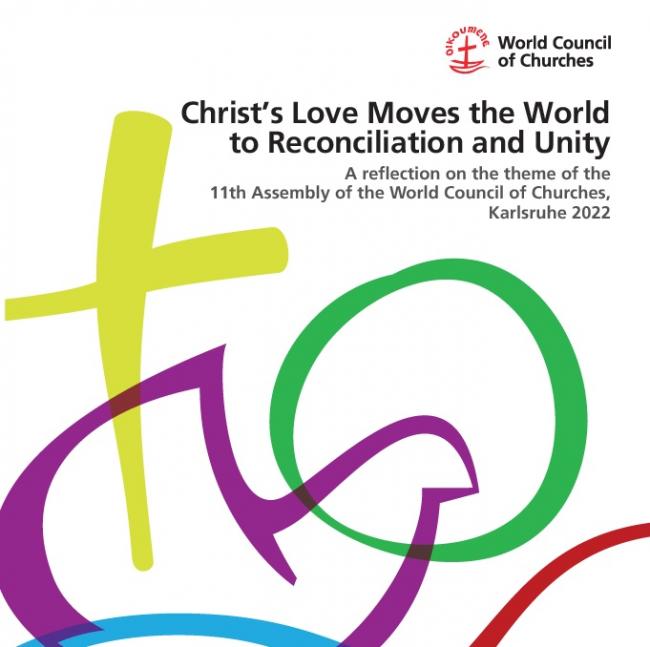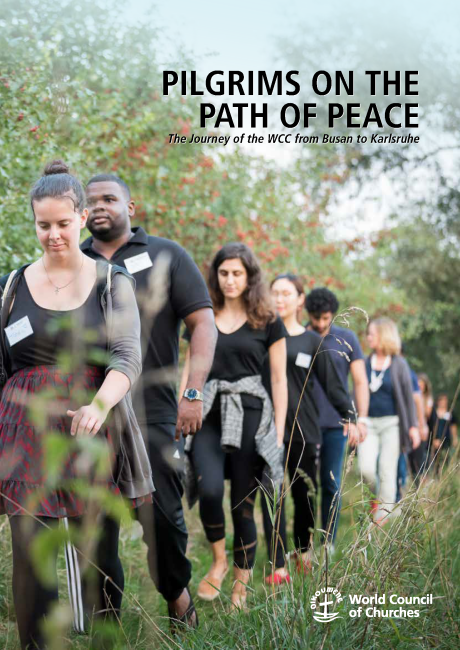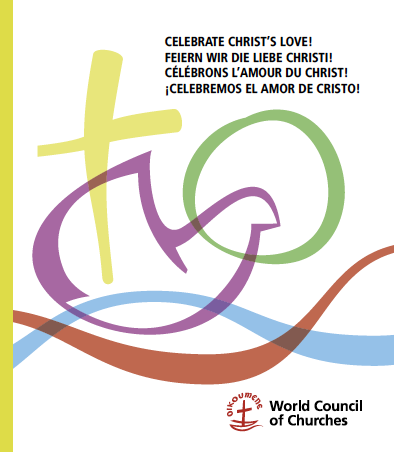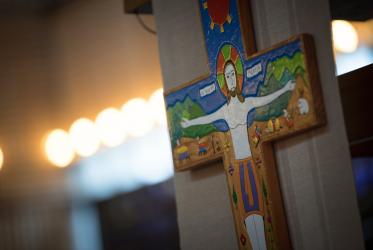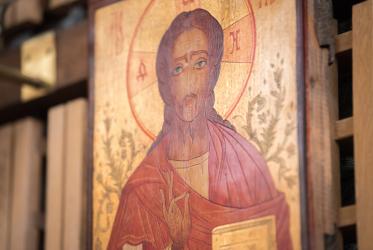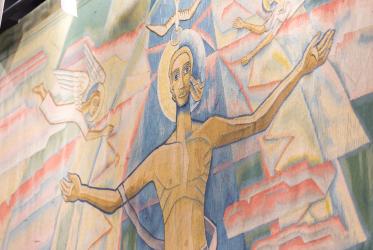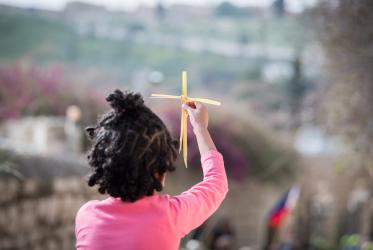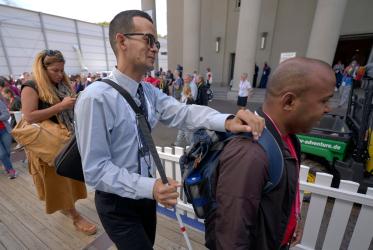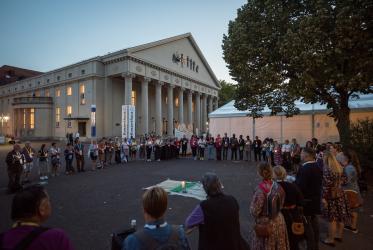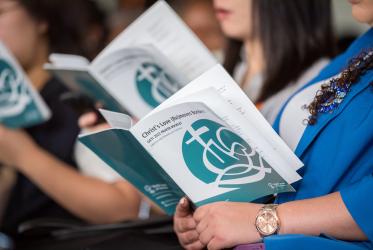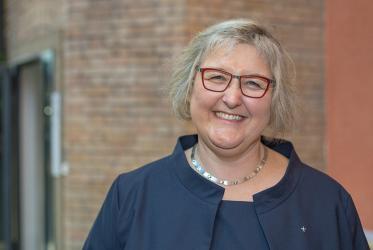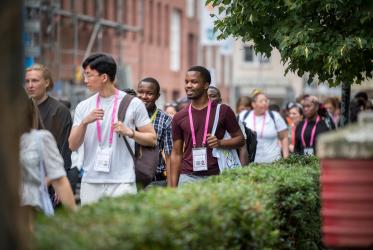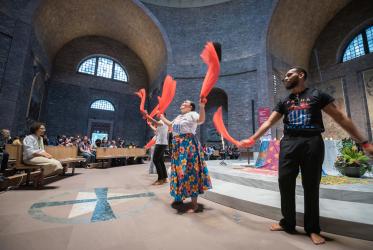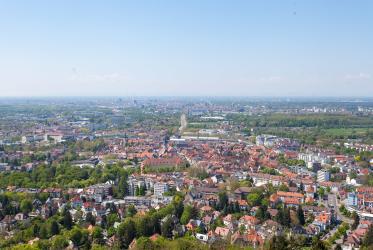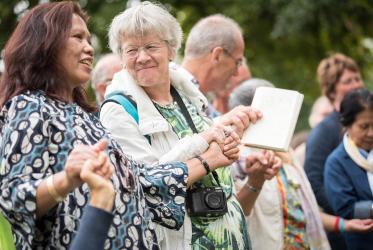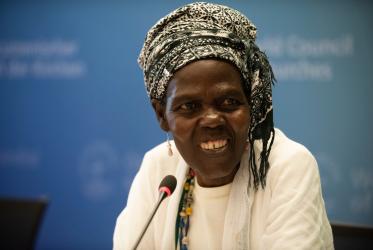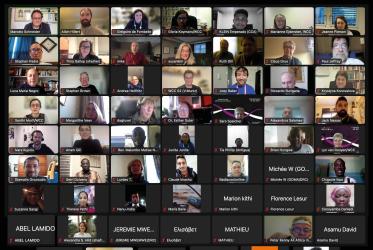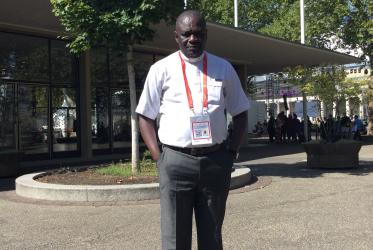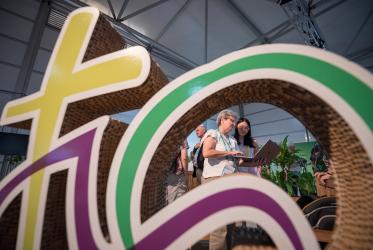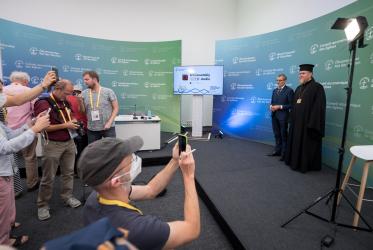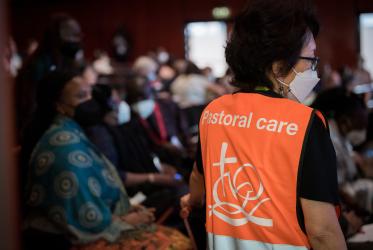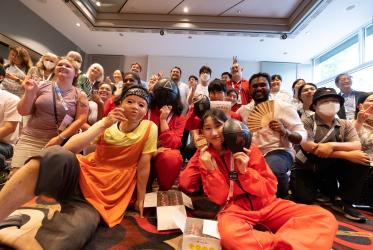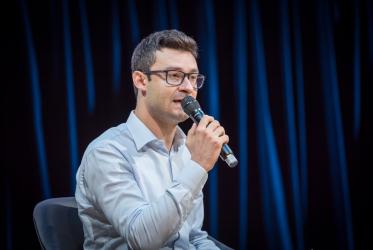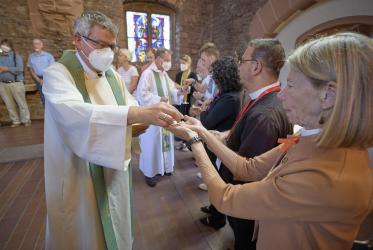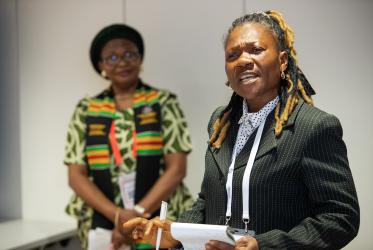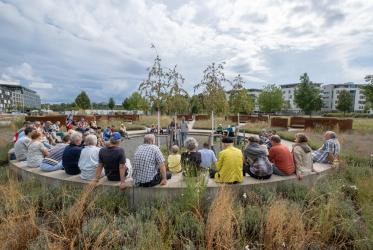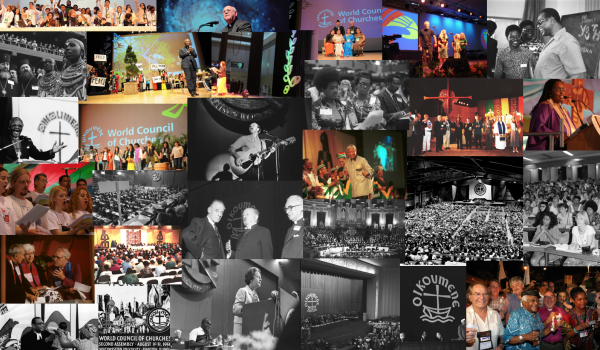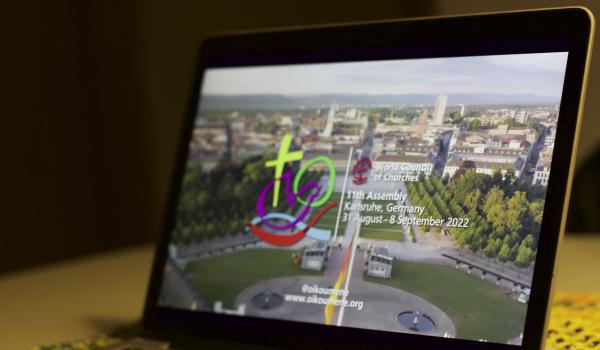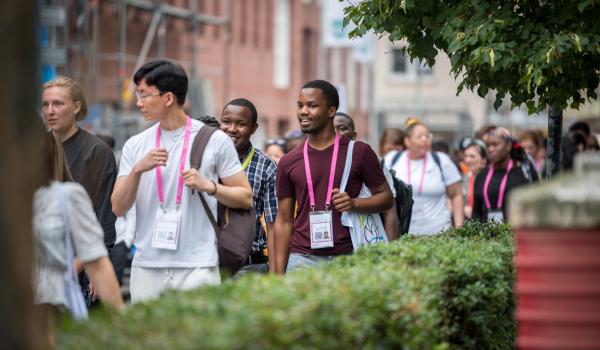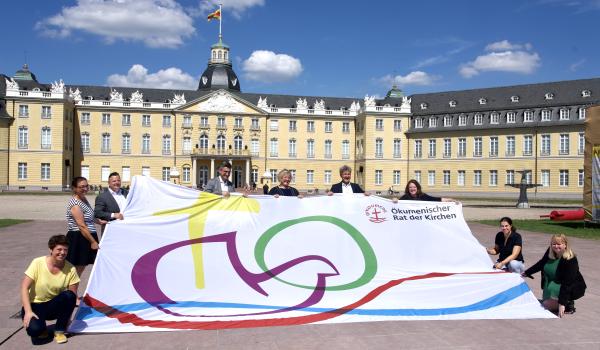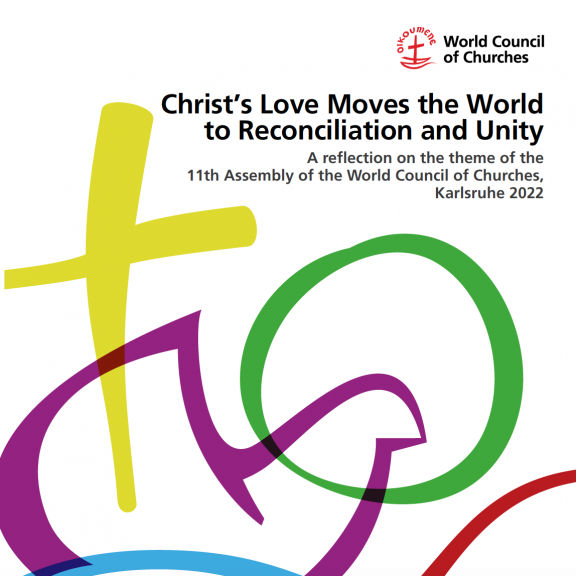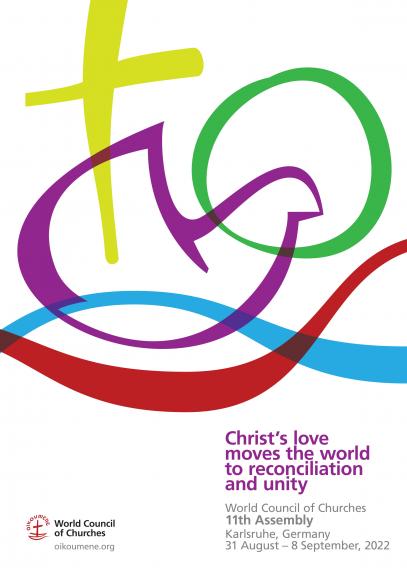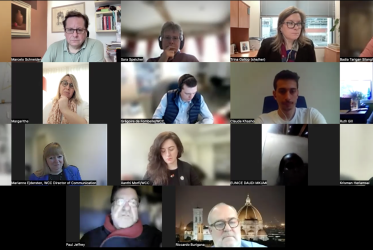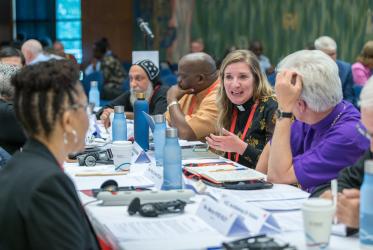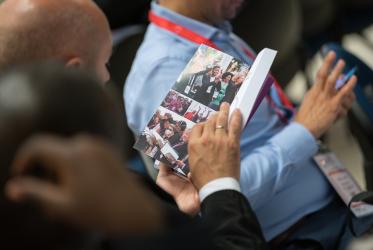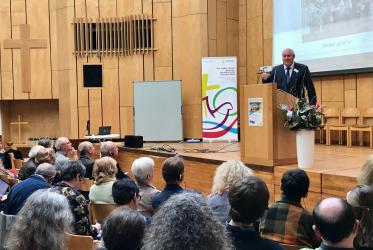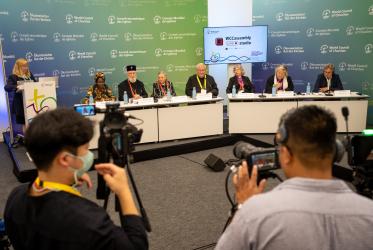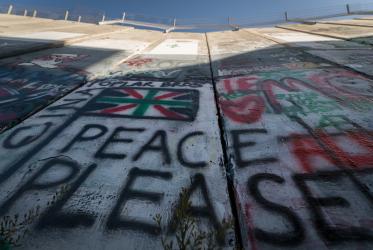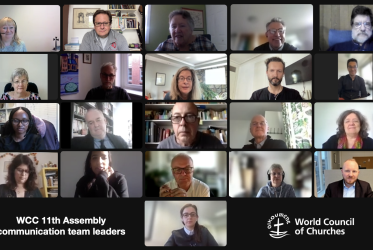The Assembly
Christ’s Love Moves the World to Reconciliation and Unity: Report of the WCC 11th Assembly
Report on the Ecumenical Conversations at the WCC 11th Assembly
- The 11th Assembly of the World Council of Churches
- Report of the WCC 11th Assembly
- Message of the WCC 11th Assembly
- Assembly statements
- Assembly documents
- Resources
- Assembly news
- Assembly photos
- Assembly videos
- Ecumenical Conversations
- Pre-Assemblies
- Past WCC Assemblies
The WCC assembly is the highest governing body of the World Council of Churches (WCC), and normally meets every eight years. It is the only time when the entire fellowship of member churches comes together in one place for prayer and celebration.
A WCC assembly is a special time in the lives of member churches, ecumenical partners, and other churches, as it brings together more than 4 000 participants from all over the world. It is a unique opportunity for the churches to deepen their commitment to visible unity and common witness. This makes a WCC assembly the most diverse Christian gathering of its size in the world.
The WCC 11th Assembly took place in Karlsruhe, Germany, at the joint invitation of the Evangelical Church in Germany (EKD), the Protestant Church in Baden, the Council of Churches in Germany, the Union of Protestant Churches in Alsace and Lorraine (UEPAL), and the Protestant Church in Switzerland.
A WCC Assembly in Germany
The WCC accepted the invitation of the member churches in Germany to hold the 11th assembly in Karlsruhe, Germany. The last assembly in Europe took place in Uppsala, Sweden, in 1968.
The city of Karlsruhe is in Baden in south-west Germany, a historical and cultural “trans-border-region.” Karlsruhe is the second-largest city in the state of Baden-Württemberg. The main venue for the assembly was the Messe-Karlsruhe (www.messe-karlsruhe.de/en), located in the heart of the city.
The local hosting church, the Protestant Church in Baden, became a united church by petition of the people in 1821. The 200-year anniversary of the unification of the church was celebrated in 2021.
A WCC Assembly in Europe
After World War II and with the changes in the geo-political situation brought about by decolonization, a new reality of a mainly Western European entity developed. At the same time, the opposition between the Soviet Union and the Western powers caused the division of the continent into East and West, which lasted until the fall of the Berlin Wall in 1989. The European churches in the ecumenical movement and the WCC have always endeavoured to maintain and nurture a sense of unity across the divide of the Cold War. This was also one of the main functions of the regional ecumenical organization created by the churches of Europe in 1959, the Conference of European Churches (CEC).
The geographical spread of the European region in the WCC and the ecumenical movement coincides, for the most part, with the political understanding of Europe stretching from the Urals to the Atlantic. On the southern side, the countries of the Caucasus are included but not Cyprus, which is grouped with the Middle East. Sub-regional affinities are fairly strong: the Nordic region (the Scandinavian countries plus Finland and the Baltics), Central Europe, Eastern Europe, the Balkans, and Southern Europe.
The Protestant churches in western and southern Europe have formed a sub-regional conference. To some extent, there is also a sub-regional confessional pattern: the large churches of the Reformation (Protestant and Anglican) are mostly in the west and north, the Catholic Church is in a majority position in the south (and in Poland), the Orthodox churches form the majority in the central and eastern parts of Europe. The churches of the Protestant Reformation (Lutheran, Reformed, Methodist) are in full communion through the Leuenberg Agreement and have formed the Community of Protestant Churches in Europe. The Anglican and (episcopal) Lutheran churches in Great Britain and the Nordic countries (with the exception of Denmark) have also signed an agreement of full communion (Porvoo). There are 81 WCC member churches in Europe.
Oasis of Peace Opening Prayer
When He Saw the Crowds - Bible Studies
Ecumenical Youth Gathering Songbook
Pilgrims on the Path of Peace
-
Publication
-
Publication
-
Publication
-
Publication
-
Publication
-
Publication
-
Publication
-
Publication
-
Publication
-
Publication
-
Publication
-
Publication
-
Publication
-
Publication
-
Publication
-
Publication
-
Publication
-
Publication
-
Publication
-
Publication
-
Publication
-
Publication
-
Publication
-
Publication
-
Publication
-
Publication
-
Publication
-
Publication
-
Publication
-
Publication
-
When He Saw the Crowds - Bible Studies
15 August 2022 -
11th Assembly Bible study - Advent and Christmas
25 November 2021 -
11th Assembly Bible study - Epiphany
20 December 2021 -
11th Assembly Bible study - Lent
20 December 2021 -
11th Assembly Bible study - Holy Week
20 December 2021 -
11th Assembly Bible study - Easter
20 December 2021 -
11th Assembly Bible study - Ascension
21 December 2021 -
11th Assembly Bible study - Pentecost
22 December 2021 -
11th Assembly Bible study - Transfiguration
22 December 2021 -
11th Assembly Bible study - The Exaltation of the Holy Cross
22 December 2021
-
EDAN Pre-Assembly starts with induction of new members
29 August 2022 -
-
-
Bishop Heike Springhart: “The world is coming to Karlsruhe!”
28 August 2022 -
-
-
Diversity of gifts celebrated by Ecumenical Youth Gathering
27 August 2022 -
-
-
An assembly mood spreads across Asia
25 August 2022 -
-
-
-
A communication reunion: looking back at the WCC 11th Assembly
21 December 2022 -
-
A look behind the scenes at the World Council of Churches 11th Assembly
23 September 2022 -
Journalists reflect on telling the stories of the WCC 11th Assembly
23 September 2022 -
WCC 11th Assembly: safe and welcoming environment for all
19 September 2022 -
Assembly workshop looked toward ending AIDS epidemic by 2030
19 September 2022 -
Squid Game and Ganggang Sullae: workshop reflects on youth poverty
16 September 2022 -
Simone de Giuseppe: “I’m still working for ecumenism in Italy”
16 September 2022 -
Hospitality and encounter: The rich welcome of German churches
15 September 2022 -
Pan-African women tell stories that celebrate who they are
15 September 2022 -
Workshop explores how interreligious dialogue brings trust and respect
15 September 2022
Report on the Ecumenical Conversations at the WCC 11th Assembly
Ecumenical Conversations (EC) were envisioned as in-depth discussions linked to the potential work of WCC commissions and other programmes. They were drawn from the insights of WCC networks, member churches, and partners and/or related to emerging ecumenical concerns. Ecumenical conversations were outcome-focused. Outcomes were shared with the assembly committees, and detailed reports were shared with future governing bodies.
Each Ecumenical Conversation took place in the same group for four days. This gave the possibility for creating safe spaces and a positive group dynamic, as well as for the participants to go in-depth into an issue. Ecumenical Conversations were open to assembly participants with a right to speak.
Participants of the Ecumenical Conversations were all official participants of the assembly plus GETI students and faculty (Delegates, Delegated Representatives, Delegated Observers, Advisors to the assembly, Advisors to delegations, Observers, Guests, GETI students and faculty).
The church is inherently missionary, and it participates in the movement of Christ’s love to the world, creating reconciliation and unity. At its best, the church’s witness to Christ is expressed in intercultural communities of faith, hope, and love: communities of redemption and renewal at a personal and collective, as well as local and global level. This Ecumenical Conversation challenges its participants to have a renewed imagination of their own journey as transforming disciples of Jesus Christ, and to consider his prophetic word to their own situation. The Ecumenical Conversation also invites them to identify the challenges we face in today’s world such as inequality, ethnic division, polarized identities, and socio-economic imbalances, encourages the WCC and its assembly to take a lead into the transforming of the world and pursue a vision of transformation that can capture the imagination of a diverse church and world in the next generation.
The Arusha Call to Transforming Discipleship is a response “to Jesus’ call to follow him from the margins of our world (Luke 4:16-19)”. The systemic marginalization of communities around the world has increased rapidly in recent years due to capitalism, militarization, authoritarian politics, systemic inequalities, racism, perceived cultural superiority, and socio-political victimization. Further to this, global mega trends such as the climate emergency and the COVID-19 pandemic have further marginalized and exacerbated existing inequalities. Affirmation 4 of the Arusha Call presents us with the charge “to joyfully engage in the ways of the Holy Spirit, who empowers people from the margins with agency, in the search for justice and dignity” (Acts 1:8; 4:31). The call from the margins is a challenge to the various centres of our world to discern how the Spirit is at work among the marginalized and to listen to and affirm what those at the margins are saying. The call from the margins of our world is a call to dreaming a new future. Compelled by this call, this Ecumenical Conversation is an invitation to dream and explore together a renewed vision of a new future from the perspectives of the margins aided by the lens of contextuality and intersectionality and its implications for mission.
Called to transforming discipleship, churches have the responsibility to work for the restoration of justice; to be in solidarity with the oppressed, the marginalized, the “least” of every society that are conveniently kept under the radars of our comfort zones. However, this necessitates also an honest, uncomfortable self-critique, a self-evaluation of our theologies and practices of mission today. This Ecumenical Conversation aspires to motivate and inspire churches to re-examine and finally re-shape their missional commitment; To emphasize the importance and urgency for a kind of discipleship that strives for the transformation of the unjust world we live in! A transformation brought about as Christ’s Love shakes and moves the world! A transformation that comes/begins from within; from within the individual disciple; from within our theologies of mission, from within our evangelistic practices and from the challenges we face as we witness to Christ's justice in a broken world, being broken ourselves.
The title of the conversation is borrowed from the theological reflection on disability which was received and approved by the WCC Central Committee in 2016 entitled “The Gift of Being: Called to Be a Church of All and for All”. The conversation will look at the various layers of marginalization based on disability through a process of critical theological reflection on our ecclesial practices and empower the churches to find meaningful inclusion within religious communities. Discussions on our common vulnerability as humans, especially in the context of the assembly theme, the COVID-19 pandemic and the Sustainable Development Goals will be explored, as well as sharing experiences on the gift of life as an endowment in countless ways from others throughout our lifetime. From the conversation the participants will get a deeper understanding of re-encountering God in the light of the experience of disability and a search for fresh understandings of what it means to live in the image of such a God.
One of the affirmations made in the Ecumenical Conversation 05 at the 10th Assembly of the WCC in Busan was “Prayer is something we can already do together. We should pray together as often as possible.” As we continue to address the issue of common prayer in the ecumenical movement in our ongoing pilgrimage towards unity and reconciliation, we must continue to affirm that our praying together is a spiritual gift. This Ecumenical Conversation will: a) examine how creation, a gift that is shared by all, can be a source that informs both the content and contour of common prayer; b) reflect on how elements of creation have already contributed to shaping Christian spirituality and theology throughout the centuries in various faith traditions and c) explore how expressions of common prayer, modelled on the shared gift of creation, can open new vistas for ecumenical prayer to be an opened door through which unity and reconciliation are approached as we welcome all believers in the Triune God to be joined together in common prayer.
What is the ecumenical relationship between new ways of being church, which have emerged in connection with the globalization of Christianity, and the search for a common understanding the Church expressed in the 2012 WCC document The Church: Towards a Common Vision? Throughout the 20th century, the landscape of Christianity changed significantly. Primarily centred in the Northern hemisphere, Christianity has become global and taken new contextualized faces in different continents. At the same time, new denominations, often proposing new ways of being church, have emerged. As a result, the search for the visible unity of the churches, which is at the core of the ecumenical movement, must face the challenge of reaching out to those communities or denominations, which so far have not been partners in the ecumenical dialogue about the Church. This ecumenical conversation will first offer a brief introduction to what the WCC Commission on Faith and Order has done in recent years on the common understanding of the Church and on the dialogue with new expressions of world Christianity. It will then propose a theological discussion on future steps towards the manifestation of Christian unity amidst a growing diversity of ways of being church.
The present world development model based on extractive economic growth is unsustainable and triggers climate change. The brunt of climate change impacts are faced by the poor and marginalized communities, including indigenous people, women, and children. Climate change manifests its impacts through water – the lack of it (drought) or excessive presence (floods). About 1/3rd of world’s population does not have access to safely managed water and about 2/3rd do not have access to safely managed sanitation facilities. COVID-19 has also shown us a snapshot of a “new normal” that is possible for a planet that is sustainable, focusing on an economy of life. The aim of this conversion is to promote a theological and ethical reflection of the urgency of climate change and water crisis and to come up with a roadmap for reconciling with nature.
The current pandemic has highlighted that health impacts all aspects of life, and that churches can and should play a more proactive role to promote a holistic understanding of health and wellness. As the world races towards the 2030 target of the Sustainable Development Goals and tries to “build back better” post-COVID-19, this Ecumenical Conversation will explore the unique contributions that churches can make at this critical juncture, from local up to the global level. This Ecumenical Conversation will: a) Reflect on the theological basis for medical mission, with implications for our times; b) Deepen the understanding of health and healing, with a focus on churches as healing communities; c) Discuss theological and ethical implications of emerging health issues; d) Explore ecumenical partnerships and resources to strengthen church health ministries globally.
Widening inequalities, persistent hunger, structural racism, runaway climate change, and destructive pandemics stem from and expose the brokenness of the prevailing global economic order, pointing to the urgency of pursuing an Economy of Life for all. In the current climate of intertwined crises, artificial intelligence, genetic manipulation, and other innovations are touted as solutions but raise profound socio-ethical concerns. Faith together with science reveal the path away from planetary breakdown towards a flourishing future, demanding deep-seated transformations in the way our societies produce and consume. This ecumenical conversation addresses the following questions: What can we harvest as good practices from churches’ engagement in promoting life-affirming economies? How do we live our faith and practice transforming discipleship in times and landscapes shaped by financial capital? What can we learn from the perspectives of communities living in the margins with a view to striving for reparative and restorative economies? What are the emerging challenges and how must we as churches respond?
Faith actors are important agents of change and transformation. Jointly, members of WCC and of ACT Alliance are recognized for their impact at local, national, and global levels – not least their diverse and innovative responses to COVID-19. How do we reinforce this? This Ecumenical Conversation aims to energize the collaborative Christian contribution to a better and more just future in three ways: (1) Share examples of Christian social action (diakonia) on issues such as COVID-19, HIV & AIDS, gender justice, climate change and other contemporary challenges. What are best practices? How can we finance and build capacity? How can we engage with the UN Sustainable Development Goals? (2) Strengthen our theological and conceptual understanding by working with the WCC and ACT Alliance document: “Called to Transformative Action – Ecumenical Diakonia”. (3) Re-imagine diaconal literacy, capacity building, and education jointly across WCC and ACT Alliance, including use of the recently published “International Handbook on Ecumenical Diakonia”.
At the Tenth Assembly of the World Council of Churches (WCC) in Busan, in response to the issues raised during the ecumenical conversations, business sessions, and other presentations regarding the challenges that issues of human sexuality pose to WCC member churches and its constituencies, the assembly through the Programme Guidelines Committee made the following recommendation: ‘Being aware of divisive issues among churches, the WCC can function as a safe space to enter into dialogue and moral discernment on matters which the churches find challenging. Examples which have been heard strongly in this assembly include questions of gender and human sexuality. Controversial issues have their place within that safe space on the common agenda, remembering that tolerance is not enough, but the baseline is love and mutual respect.’ In response to the above recommendation, the WCC general secretary formed both a Staff Group and a Reference Group on Human Sexuality to work on a resource document, which was presented to the WCC executive committee in November 2019. The executive committee received the document and recommended to ‘transmit the report to the central committee for information with the suggestion that the WCC 11th Assembly could have an Ecumenical Conversation on this topic’. The aim of this ecumenical conversation is to create a space for dialogue and discussion on human sexuality as it is being carried out in different contexts of the WCC fellowship and how the conversation can be carried out in the future, emphasizing love and reconciliation.
This Ecumenical Conversation will discuss and reflect on trends in a rapidly changing world, that will affect the life and work of churches 20 years from now; guide ethical and moral discernment and contribute to checks and balances for the development and utilization of these technologies. It will focus on new ways of being Church and community, Demographic transformation, Artificial Intelligence (AI) and Genetic Modification. The participants will discuss the implications of these key issues in the life of the Church and recommend steps for faith communities to provide ethical and moral discernment and accompaniment and contribute to checks and balances for the development of these technologies. The facilitators will bring in-depth expertise and initiate group conversations. The participants will receive succinct and comprehensive resource material on the subjects well in advance and are expected to reflect on and review the issues from their contexts as a preparation for the conversations.
The question of Just Peace in the Middle East remains at the heart of the work of the Ecumenical Movement. Unfortunately, long lasting circles of violence, political instability, destruction of the social cohesion systems in place, and social injustices threatened all populations of the region, but above all the most vulnerable among the religious, ethnic, and cultural components, such as the Christians. The crucial question of the historical Christian presence and witness in the Middle East shifts to a narrative of terrorism, extremism, and threatening Christians in the Middle East. The ecumenical movement has an important role to play in shaping the future narratives for peace and social cohesion while ensuring and strengthening the role and place of Christians as equal actors and partners of the Middle East.
The period from Busan (10th Assembly) to Karlsruhe (11th Assembly) has been defined by the Pilgrimage of Justice and Peace, pursuing a holistic vision of just peace as described in the 10th Assembly Statement on the Way of Just Peace. This Ecumenical Conversation will examine how churches in key national contexts – especially those identified as priority countries during this period – have responded to this call, the challenges they have faced, how the ecumenical movement has sought to support and accompany churches and communities in those contexts, and the impact of those efforts. (A separate Ecumenical Conversation – No. 13 – will address the issue of Just Peace in the Middle East.) In addition to learning about churches’ efforts to promote a just peace in their own contexts, this Ecumenical Conversation will seek to identify best practice/lessons learned from these experiences, and to further develop the ecumenical approach to holistic peacebuilding.
This Ecumenical Conversation will address concerns about Christian suffering, persecution and marginalization and promote the understanding and acceptance of the principle of Freedom of Religion or Belief (FoRB) as applicable for all people regardless of faith or belief. The issue of how FoRB claims are sometimes used to suppress the rights of others must also be addressed. Different regions and different groups of people – i.e., women, children, people with disabilities, and migrant populations experience violations of FoRB differently. Consideration of the different impacts will be integrated across the conversation, as will the theological underpinnings of the principles of FoRB. The conversation will comprise four elements – introduction to the topic, context and sharing of experiences, the role of the church, and tools for advocacy. The conversation will inform and challenge attitudes about the different facets of FoRB beyond the usual geographic contexts and own faith orientations of participants, building on the assembly theme “Christ’s love moves the world to reconciliation and unity.”
The legacy of slavery and colonialism continues to affect the lives of millions today: white supremacy, racial discrimination against black and brown bodies, Afrophobia, xenophobic violence, racism and white privilege, racism in relation to gender violence, hate speech against minorities, discrimination, and exploitation on the basis of religion and caste. The aim of this Ecumenical Converstation is to create awareness of the complex and intersectional nature of racism and its manifestations, to deepen awareness of and confront the churches’ past and ongoing complicity with racism and the ways these have justified and validated racism, and to identify as well as uphold existing markers for anti-racist and anti-discriminatory behaviour. These principle markers and new life affirming possibilities will be made available to churches as a resource. Throughout the four sessions, the Ecumenical Conversation will include personal testimonies, storytelling, small group sharing, panels, and short presentations.
Migration and/or human mobility in its varied forms not only poses specific challengers concerning human rights, it calls into question the ongoing mission and prophetic role of the church. This Ecumenical Conversation will explore the tensions and intersections between human rights and Christian faith; and the churches pastoral, prophetic and public role. The Ecumenical Conversation will explore the changing and extremely diverse profiles of people on the move, the challenges migration raises, and the many ways migrants transform ecclesial life, mission, and praxis. As migration is likely to become increasingly complex in the years to come, this Ecumenical Conversation will consider how and why it is necessary for churches to continue to be strong witnesses and advocates in the public sphere as well as addressing current, emerging, and future migration challenges.
Trying to bridge the theological and practical dimensions of interreligious dialogue, this Ecumenical Conversation will explore interreligious solidarity as a viable model of interreligious engagement in world affected by the COVID-19 and many other ongoing pandemics. Using the WCC-PCID joint document on ‘Serving a Wounded World in Interreligious Solidarity’ as a foundation, it will develop strategies to foster practical interreligious solidarity in a multi-religious world. It will begin by exploring the spiritual/theological inspiration for interreligious solidarity within religious traditions and seeking to understand how solidarity is built into the self-understanding of religious communities. Then, using experiences of interreligious solidarity as a prism, participants will analyze: a) What approaches to solidarity have worked well so far? b) What issues pose obstacles to interreligious solidarity? It will seek to build this analysis into action by reflecting on strategies to translate interreligious engagement into interreligious solidarity in a post-COVID-19 World.
Theological education is a key concern of the ecumenical movement. It provides a vital space for developing and nurturing constructive theological reflection in midst of changing ecclesial and religious landscapes. In view of sectarian and inward-looking tendencies, ecumenical theological education calls upon churches to reflect jointly and profoundly on the nature and mission of the church in the world. This Ecumenical Conversation will discuss the opportunities and challenges, with particular reference to how pedagogical innovation, methodologies, epistemologies, curriculum development, and institutional frameworks could strengthen the ecumenicity of theological education today. This Ecumenical Conversation at the WCC Assembly will seek to explore ecumenical theological education as a profound reflection of lived mutuality and unity and envision (with theological rationale and historical precedence) ecumenical theological education as a project for resistance and transformation today.
Current global realities, including the COVID-19 pandemic, climate change, and violent conflicts, have resulted in increased sexual and gender-based violence and widened the social and economic gap between men and women. These gaps present a distinctive challenge to the unity within the church, and the reconciliation we seek among all people. Recent World Council of Churches initiatives – including the Gender Justice Principles, the Decade of Churches in Solidarity with Women (DCSW) 20th Anniversary Commemoration Consultation strategies, and Women of Faith Pilgrim Team Visits – offer to the church a basis for programmatic work toward ending inequality and violence (building on the WCC’s history of gender justice work). This conversation invites the WCC and its member churches, to foster unity and reconciliation in relation to justice between men and women through its programs and leadership structure during the post-assembly period. This will promote inclusion and holistic development in church and society.
WCC’s history is closely connected with that of modern international human rights law, starting with the drafting of the Universal Declaration of Human Rights (UDHR) in 1948. However, in many parts of the world today the legitimacy of the principles and obligations expressed in international human rights law are being undermined and attacked as never before. Moreover, there is an increasingly evident diversity of perspectives within the ecumenical movement on the relationship between Christian faith principles and international human rights law. Drawing on the outcomes of a prior process of reflections, consultations, and publications (2020-2022), this Ecumenical Conversation will explore this issue from a range of theological and regional/cultural perspectives, and in light of the experiences of victims of human rights violations. This Ecumenical Conversation will seek to (re)establish an ecumenical consensus with regard to church engagement in promoting and protecting human rights, utilizing the instruments of international human rights law.
How can churches enter into a constructive dialogue about disagreements on moral issues? The new Faith and Order study document “Churches and Moral Discernment. Facilitating Dialogue to Build Koinonia” invites churches to explore together the different dimensions of moral discernment. The uniqueness of this study is that, based on the self-descriptions of diverse church traditions and the study of historical examples, it proposes a tool that helps to navigate the landscape of moral discernment in the churches. It provides a detailed study of the relationship between continuity and change. The “conscience of the church” is proposed as a key concept that articulates the living engagement of the church with new challenges. The ecumenical conversation at the WCC Assembly will discuss insights from this study together with a sharing from contemporary processes in local churches, regional ecumenical bodies and dialogues within and between Christian World Communions.
Participants in this Ecumenical Conversation will share inspiring stories of the Pilgrimage of Justice and Peace (PJP) and reflect together both on the spiritual grounding of the PJP and four existential topics that show how people experience the impact of violence, structural injustice, and the climate crisis as threats to their communities and the physical basis of their lives: Truth and trauma, land and displacement, gender justice, and racial justice. These four topics are rooted in the authentic and transformative spiritualities of local communities. Seen together as cornerstones of a theology of companionship, they could become an inspiration for the ecumenical movement in the coming years.
Information about the WCC Specialized Ministries pre-assembly: 9-10 March, 2022
Information about the Just Community of Women and Men Pre-Assembly: 29-30 August 2022
Information about the Indigenous Peoples Pre-Assembly: Karlsruhe, 28-30 August 2022
Information about the Ecumenical Youth Gathering and WCC Youth pre-assembly: 27-30 August, 2022
Information about the Orthodox Pre-Assembly of the 11th Assembly of the World Council of Churches: Cyprus, 9 - 16 May, 2022
Information about the Ecumenical Disabilities Advocates Network Pre-Assembly: Karlsruhe, 29 - 30 August 2022.
Walk through the WCC assemblies of the past in a series of short videos, beginning with the first in 1948 up to the WCC 11th Assembly in 2022.
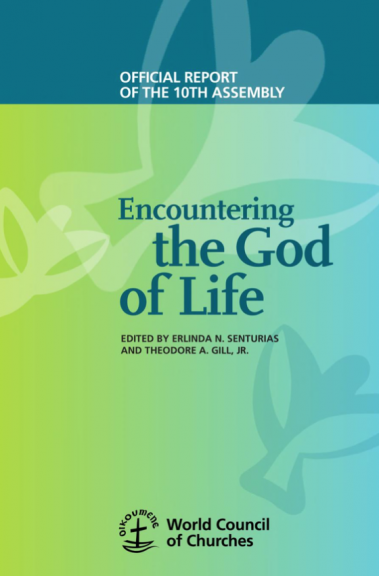
Place: Busan, Republic of Korea
Dates: 30 October - 8 November 2013
Theme: God of life, lead us to justice and peace
Member churches: 345
In the message of the WCC 10th Assembly, participants offered this affirmation:
“We share our experience of the search for unity in Korea as a sign of hope in the world. This is not the only land where people live divided, in poverty and richness, happiness and violence, welfare and war. We are not allowed to close our eyes to harsh realities or to rest our hands from God’s transforming work. As a fellowship, the World Council of Churches stands in solidarity with the people and the churches in the Korean peninsula, and with all who strive for justice and peace.”
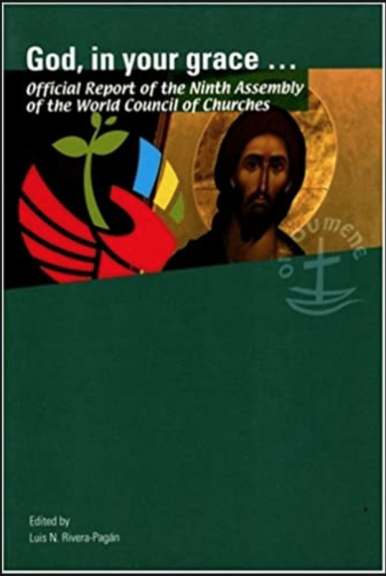
Place: Porto Alegre, Brazil
Dates: 14-23 February 2006
Theme: God in your grace, transform the world
Member churches: 348
The 2006 assembly was one of the most representative gatherings of Christians ever held - with over 4,000 participants from ecumenical organizations and groups, delegates from 348 member churches, observers and visitors from all around the world.
Addressing the core issues of Christian unity, the Assembly agreed on a new text, "Called to be the One Chruch," and urged that WCC and its member churches give priority to the questions of unity, catholicity, baptism and prayer. Other key issues discussed at plenary sessions were Economic justice, Christian identity and religious plurality, and Youth overcoming violence.
Also, delegates adopted a substantially revised Constitution and Rules which moved the WCC to decision-making based on consensus and which amended membership criteria. Steps were taken to strengthen active involvement of youth (under 30 years) in the life and work of the Council.
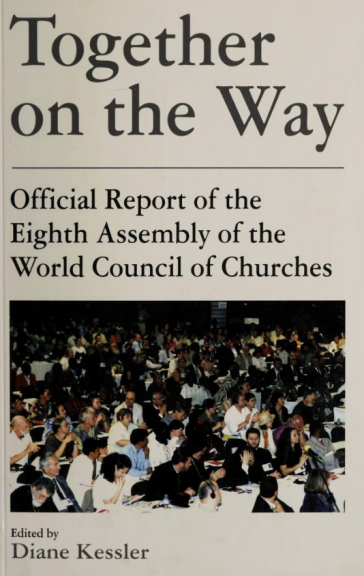
Place: Harare, Zimbabwe
Dates: 3-14 December 1998
Theme: Turn to God - Rejoice in Hope
Member churches: 339
Half a century after the official foundation of the WCC, its member churches renewed their commitment to stay together, and delegates promised to remain in solidarity with their African hosts.
The Assembly decided to set up a commission on the participation of the Orthodox churches in the WCC. It backed the creation of a "Forum of Christian Churches and Ecumenical Organizations" which could extend the ecumenical outreach far beyond WCC member churches.
Delegates and assembly visitors participated in more than 600 contributions to a three-day "Padare" in which subjects ranged from Evangelical-Orthodox dialogue to human sexuality. It was preceded by a Decade Festival of churches in solidarity with women.
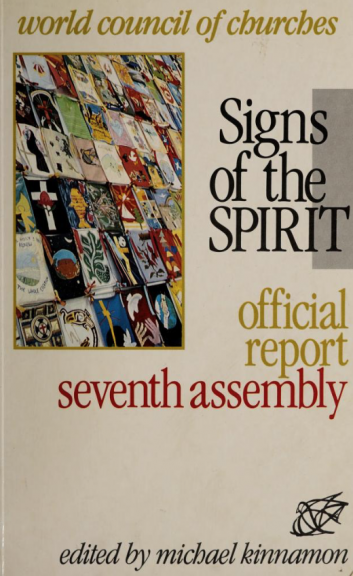
Place: Canberra, Australia
Dates: 7-20 February 1991
Theme: Come, Holy Spirit - Renew the Whole Creation
Member churches: 317
1991 was the first time a theme had explicitly invoked the third person of the Trinity, and it did so in the context of the physical universe. Sections were organized under four sub-themes:
- "Giver of life - sustain your creation!"
- "Spirit of truth - set us free!"
- "Spirit of unity - reconcile your people!"
- "Holy Spirit - transform and sanctify us!"
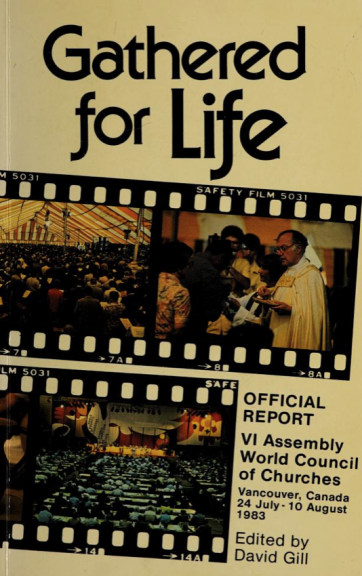
Place: Vancouver, British Columbia, Canada
Dates: 24 July to 10 August 1983
Theme: Jesus Christ - the Life of the World
Member churches: 301
At this assembly on the western shores of Canada, a renewed emphasis on common worship was experienced under the great white tent standing beneath the summer sun. Hope for closer fellowship arose from dialogue on the Baptism, Eucharist and Ministry (BEM) document, and such ecumenical experiments as the Lima Liturgy. At the same time, the nuclear threat and neo-colonialism glowered like dark clouds on the horizon. The Assembly proclaimed its theme: "Jesus Christ - the Life of the World", and carried out its work in the following issue groups:
- Witnessing in a divided world
- Taking steps towards unity
- Moving towards participation
- Healing and sharing life in community
- Confronting threats to peace and survival
- Struggling for justice and human dignity
- Learning in community
- Communicating credibly
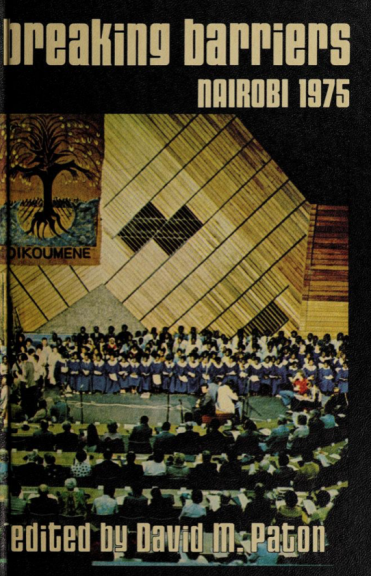
Place: Nairobi, Kenya
Dates: 23 November to 10 December 1975
Theme: Jesus Christ Frees and Unites
Member churches: 285
"Jesus Christ frees and unites" the delegates sang in the midst of Nairobi's life:
people from around the earth, standing before God in their captivities and disunities and naming a divine possibility.
The assembly section titles echo concerns of that turbulent decade:
- Confessing Christ today
- What unity requires
- Seeking community
- Education for liberation and community
- Structures of injustice and struggles for liberation
- Human development
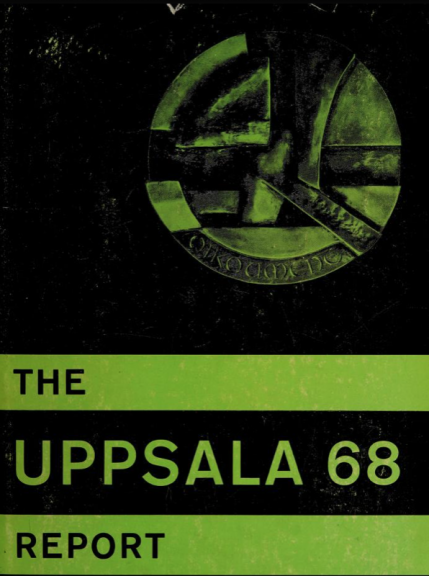
Place: Uppsala, Sweden
Dates: 4-20 July 1968
Theme: Behold, I make all things new
Member churches: 235
The assembly at Uppsala bore further testimony to the expanding membership of the Council, as well as the fresh breezes of Vatican II that brought Catholic observers to participate in the meeting and discuss further opportunities for cooperation. Sections were organized under the headings:
- The Holy Spirit and the catholicity of the church
- Renewal in mission
- World economic and social development
- Towards justice and peace in international affairs
- Worship
- Towards new styles of living
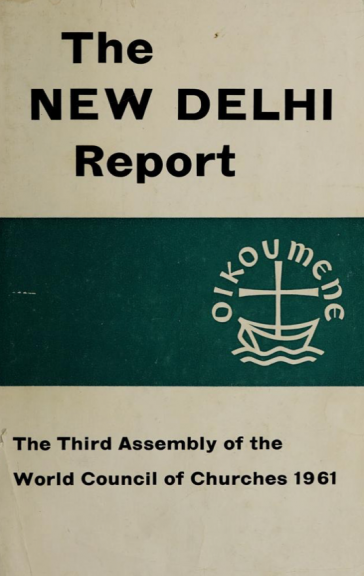
Place: New Delhi, India
Dates: 19 November to 5 December 1961
Theme: Jesus Christ - the Light of the World
Member churches: 197
Best remembered for the incorporation of the International Missionary Council into the WCC, and the admission of 23 new member churches, including significant sectors of Eastern Orthodoxy and churches from newly independent nations, the Assembly focused on the theme "Jesus Christ - the Light of the World" with three sections on witness, service and unity.
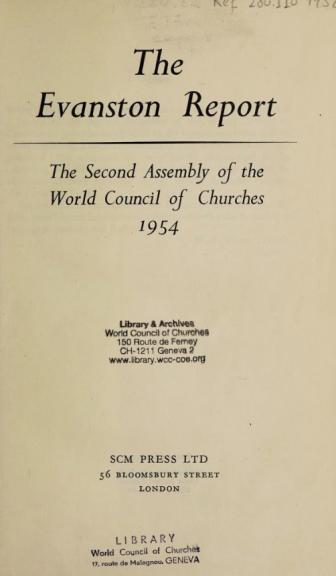
Place: Evanston, Illinois, USA
Dates: 15-31 August 1954
Theme: Christ - the Hope of the World
Member churches: 161
The only WCC assembly to date held in the United States, it to some degree reflected - and certainly reflected on - the East-West tensions of the cold war. The Assembly divided its work into six sections:
- Our oneness in Christ and our disunity as churches
- The mission of the church to those outside her life
- The responsible society in a world perspective
- Christians in the struggle for world community
- The churches amid racial and ethnic tension
- The laity: the Christian in his vocation
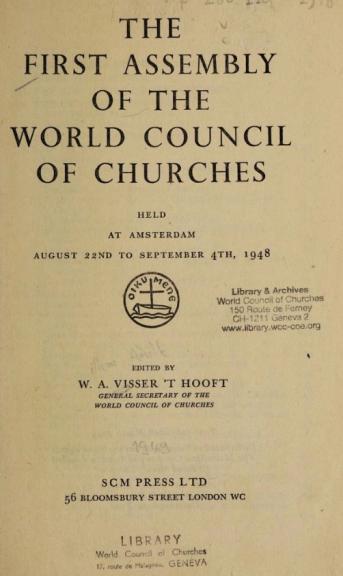
Place: Amsterdam, The Netherlands
Dates: 22 August to 4 September 1948
Theme: Man's Disorder and God's Design
Member churches: 147
It was on the 23rd of August 1948, in Amsterdam, that the World Council of Churches was officially founded. 147 churches from different confessions and many countries came together to commit themselves to the ecumenical movement.
At the assembly in Amsterdam, four sections were organized to examine aspects of the theme "Man's Disorder and God's Design":
- the universal church in God's design,
- the church's witness to God's design,
- the church and the disorder of society,
- the church and the international disorder.
Visit the WCC 11th assembly in Karlsruhe in 360° and learn more!
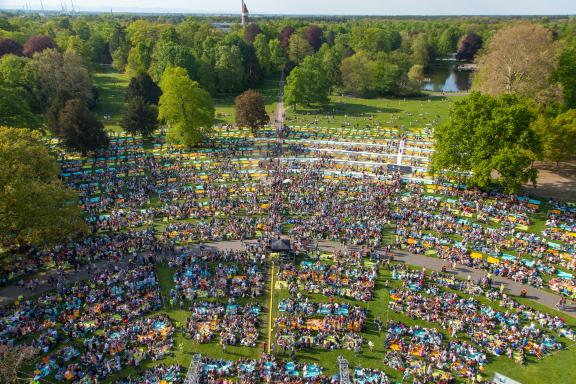
Prayer life
At the heart of the global ecumenical gathering of delegates and visitors to the WCC 11th Assembly was its spiritual life. Each morning attendees began the day with interconfessional prayer. The main elements of these opening spiritual moments were singing, reading Scripture, praying, and reflecting on the key biblical theme and message for the day.
Other spiritual life moments were offered throughout each day. They included Home Group Bible studies, where delegates had the opportunity to engage more deeply with the biblical text for the day.
Having access to Home Groups, which were small in size and language-structured, ensured that the discussions that unfolded within these settings were informed by all the participants. These Home Groups ended with a short midday prayer. As each day ended, there was another opportunity for delegates and visitors to participate in evening confessional prayers. This allowed all to experience a spiritual moment that reflected just a sample of the extensive spiritual diversity that is the fellowship of the Council.
As the business sessions and thematic plenaries of the assembly unfolded, the spiritual life components were offered to nurture the soul and renew the spirit as we sang, prayed, and - through moments of silence and reflection - discerned the future direction and action of the global ecumenical movement.
We believe our times of worshipping together have served to affirm where God is leading us, as together we declared that Christ’s love is moving the world to reconciliation and unity.
Thematic plenaries
The daily thematic plenary focused on a particular aspect of the assembly theme. The assembly planning committee cooperated with the assembly worship planning committee to ensure a thematic as well as spiritual flow.
Business plenaries
Business plenaries were the place where delegates from WCC member churches addressed the assembly and drew an overview of the WCC’s work until the next assembly. Their role was to elect the new central committee and WCC presidents.
Home groups
Taking place every morning after the biblical reflection and thematic plenary of the day, Home Groups offered people an opportunity to engage with one another by reflecting on prayer, biblical passages, plenaries, and other encounters.
All participants that had a right to speak at the assembly were allocated to a Home Group. Home Groups were comprised of participants from across regions, confessions, professions, age, “old-timers” and “newcomers” at the assembly.
The purpose of home groups was to:
- Enable a meaningful and trans-contextual engagement with the daily theme and biblical message
- Provide space for mutual exchange and learning
- Capture a key insight per day for dissemination at the assembly (200 characters)
- Share the outcome of joint trans-contextual discernment with WCC governing bodies, member churches, and partners (800 - 1000 words per home group)
The theme of the 11th Assembly of the World Council of Churches was "Christ’s love moves the world to reconciliation and unity".
The assembly gathered amidst perplexities, anxieties, and fundamental questions about the way we inhabit the earth, make sense of our lives, live in society, and accept responsibility for future generations. These questions have been amplified by the global COVID-19 pandemic and its consequences, the climate emergency, and manifestations of racism worldwide, which have further revealed structural economic inequality, gender discrimination, and other forms of injustice in our societies and in our world.
In this fragmented and fractured world, the assembly theme was an affirmation of faith that Christ’s love transforms the world in the life-giving power of the Holy Spirit. Against the powers of destruction and sin, the assembly theme affirmed that the love of the compassionate, crucified, and risen Christ is at the heart of this world. It was a radical call to the churches to work together unceasingly and with people of other faiths and all those of good will for just peace and reconciliation. It was a call for the visible unity of the church to become a prophetic sign and a foretaste of the reconciliation of this world with God, and the unity of humankind and all creation.
Created as a visual expression of the assembly theme, the symbol’s design was also inspired by the dynamic expressions and variety of the ecumenical movement in its search for Christian unity and promotion of justice and peace.
Inspired by the theme “Christ’s love moves the world to reconciliation and unity,” the WCC fellowship came together as a whole in prayer and celebration at the 11th Assembly. We drew renewed energy for the WCC’s work far beyond the event itself. That’s why, anytime the assembly symbol was used, it also offered space for the WCC official logo.
The symbol was formed by four elements:
- The cross - the assembly theme is an affirmation of faith that Christ’s compassionate love transforms the world in the life-giving power of the Holy Spirit. Placed prominently in the symbol, the cross is an expression of the love of Christ and a reference to the first article of the WCC Constitution.[1]
- The dove - a universal symbol of peace and reconciliation, the dove stands for the Holy Spirit and also refers to deep biblical expressions of hope.
- The circle - the whole inhabited world (oikoumene) – brings a sense of unity, a common goal, and a new beginning. The circle is also inspired by the concept of reconciliation. As Christians, we have been reconciled with God through Christ, and as churches, we are agents of forgiveness and love both within and outside our communities. The ecumenical movement has responded to the call for unity and reconciliation through resolute work and action for a more just and participatory society and the care for God’s Creation.
- The way - we all come from different places, cultures and churches; we walk different paths responding to God’s call; we are all on a pilgrimage through which we encounter others and join together on a journey of justice and peace. The different paths represent our various journeys, the movement, freedom and vibrancy of life that drive the WCC and its member churches around the world.
The vision of the WCC Stewards Programme has always been large. W.A. Visser’t Hooft, the first general secretary of the WCC, saw the stewards as bearers of the future. He wanted young people to encounter ecumenism and its leaders, so that they might one day become its leaders.
The Stewards Programme is an ecumenical introduction. For many people it is been the first, or at least, an early step, that led to greater involvement in ecumenism and opportunities for learning and growth.
Young people who serve as stewards are not merely observers of meetings or assemblies but also participants. They are the circulatory and respiratory systems of the ecumenical movement - and they are vital to its life.
At the WCC 11th Assembly, there was a group of young people, ages 18-30 years old, participating as stewards. The Stewards Programme brought together 160 young people from different countries, regions, and traditions for an opportunity to contribute to the operations of the assembly and to participate in ecumenical learning, encounters, and discussions.
There are three aspects of the Stewards Programme:
a) intentional ecumenical formation designed to build awareness, develop leadership, and strengthen global solidarity;
b) participation and contribution of young people to major WCC meetings as “yeast of the ecumenical loaf”;
c) support the inspiring and efficient flow of the meeting.
A steward is an invaluable ecumenical resource. In order to become a steward, an applicant had to go through a competitive selection process in which church and ecumenical involvement were prioritized. WCC looked for young people capable of integrating their experience back into their local contexts, motivated to multiply their ecumenical enthusiasm, and ready to “do ecumenism” locally.
Therefore, stewards are not merely helpers or an unqualified labour force. They are young persons committing time, energy, skills, knowledge, and visions to building the ecumenical movement. They are leaders in their churches, communities, organizations, and in the ecumenical movement, and they are, or will be, the ones taking the ecumenical movement forward.
Stewards’ working areas at the assembly included floor management, communication, worship, documentation, and registration. Stewards came to serve the meeting as a whole. Therefore, they were not requested to perform tasks by individual delegates or other participants unless this was coordinated through the WCC staff working with the stewards.
During the assembly, stewards carried out their tasks but also – when off-duty – participated in worship, confessional meetings, and small group discussions. Whenever possible, they were given the opportunity to speak and share their experience. They contribute a lot!

